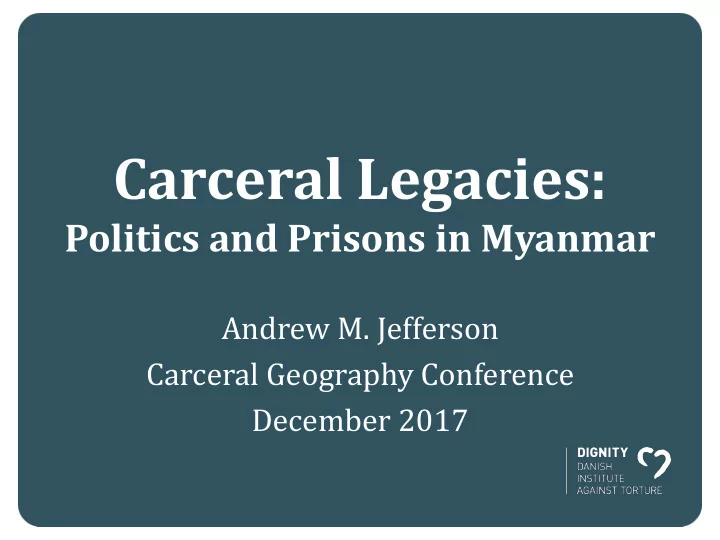

Carceral Legacies: Politics and Prisons in Myanmar Andrew M. Jefferson Carceral Geography Conference December 2017
Vignette • U Thant, died 1974 • UN Sec Gen 1961-71 • Contestation over corpse • Students V Govt Foto credit: https://archives.un.org/content/un- secretary-general-u-thant • Intersections between history, politics, repression and resistance
Structure 1. Introduction 2. Legacies – a concept 3. Case presentation and analysis: one man’s journey into politics in Myanmar 4. Conclusion Towards better understandings of practices of state- and subject-making, as they take place in time…
Prisons ‘ beyond the west ’…
This project explores the historical and contemporary role of detention in Myanmar and its significance for the reconfiguration of state and society.
Martin, Jefferson & Bandyopadhyay(2014), Sensing prison climates: Governance, survival, and transition, Focaal, Journal of Global and Historical Anthropology 68: 3-17.
“The theoretical purpose of the article is to explore whether an expansive notion of confinement might help us make sense of the lives of people whose possibilities are limited materially, spatially and discursively… The argument is that an expansive notion of confinement that attends to space, time, practices, meanings and states of mind is a useful way of thinking about the situated struggles of people living in prison and relative poverty .” Jefferson, 2012, Criminology and Criminal Justice
Historical ontology is… ‘…about the ways in which the possibilities for choice, and for being, arise in history’ (Hacking 2002: 23).
Our project is not a historical project per se but we make use of the past and we invoke a temporal concept (legacies) to illuminate present ‘ constitutings ’, consequences and directions.
A legacy outlives its giver. It is an imprint, not always clearly decipherable and not always easy to interpret. Legacies, thus, represent a hermeneutic challenge.
It involves a focus on dynamics of production, an orientation to trajectories and influences, and take-up or appropriation…
The case • Thinking about legacies is a promising way to think about the ways practices of carcerality make themselves felt. • A journey into politics: – Exploring what the sites, practices and states of mind associated with incarceration have meant for contemporary politicians in Myanmar, how they have mattered and how they came to matter.
Timeline • Early 80s: University • 8.8.88: Leading role in protests • 1988-97: Imprisoned; also briefly in 1999 • 1999-2007: Recuperating, laying low • 2007-14: Forming a family, moving back and forth between country and city • 2015: Elected to regional parliament
Holland and Lave (eds) History in Person: Enduring Struggles, Contentious Practice, Intimate Identities
Thanks for your attention! Check out www.gprnetwork.org
Recommend
More recommend